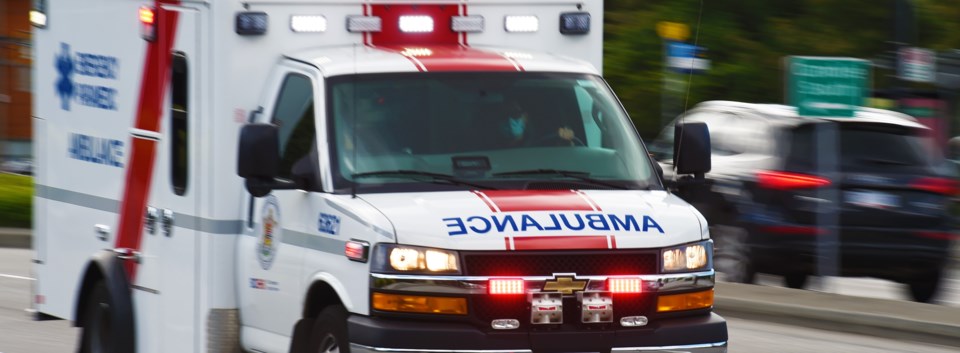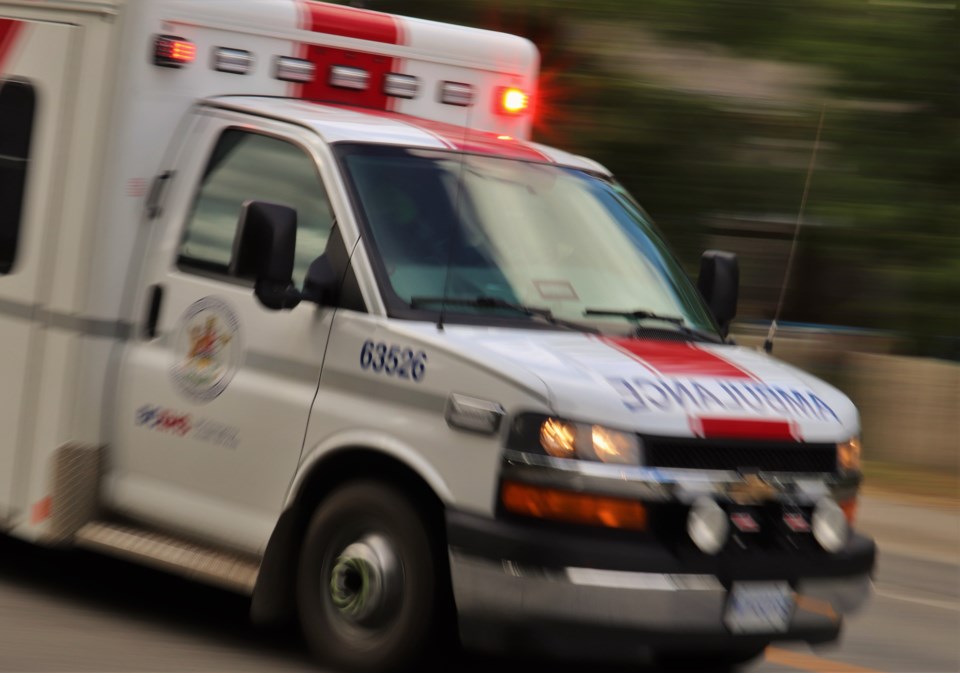Most Vancouverites spent late June figuring out the best way to keep cool.
For one Metro Â鶹´«Ã½Ó³»paramedic, the night of Monday, June 28 was spent working.
"I don't think any of us who showed up [that day] could have predicted just how horrific it was," says Frank. (V.I.A. has agreed not to identify him as paramedics aren't allowed to speak publicly about their work.)
While people knew the heat wave was coming, Frank says there wasn't any extra planning from management to prepare for what was being forecast. He says they got one email.
"It was an email suggesting and giving some tips on how to stay cool between calls," he says. "The kind of things that if you didn't already know you shouldn't be a paramedic."
June 28: "There were nurses crying, there were paramedics collapsing"
Frank says the June 28 shift "was the most horrific experience" in his decade-plus on the job, calling the shift "carnage."
The area he worked in is known as Channel 2, which includes Surrey, Delta, Richmond, Langley and White Rock.
While Frank says "it's not uncommon for there to be some calls on holding," when a shift begins — maybe 10 to 25 calls waiting, on June 28 "there were over 250 calls holding," he says. "These were incredibly high priority calls."
At least 10 were for cardiac arrests, where no ambulance had been sent yet.
"30 to 40 were people who were having serious chest pain calls — typically two ambulances and fire truck go — but had no one going to them," Frank says.
Normally ambulances try to respond to those calls within 15 minutes. Patients were already going hours without seeing an ambulance arrive.
The paramedics, overrun with calls and working in extreme heat conditions, were themselves struggling.
"Paramedics were not in uniform, they were red, sweaty, looking unwell," Frank describes. "Some were vomiting while their partner was saying they gotta go to the next call."
At Surrey Memorial Hospital, where he was taking some patients, the situation was dire.
That night, "overrun" with patients, Frank says "the state of the hospital was a war zone."
Patients were in the hallways, on the floor. At the same time, the dead were being stored in waiting areas and hallways because people were dying and there was nowhere to put them.
"There were nurses crying, there were paramedics collapsing," he says. "People were showing up in their cars with dead people."
He was hearing stories from other parts of B.C.'s emergency health service as well. People were reporting an hour wait just to get through to the ambulance service when they called, watching their loved ones struggle.
High-priority calls holding over 15 hours
Calls that come in are rated yellow, orange, red or purple. Purple are the most serious, for things like cardiac arrest, and normally two ambulances and a fire truck would be sent with lights and sirens. Red is for someone at risk of going into cardiac arrest (or something similar) and gets a similar response. Orange is less serious, and only one ambulance is sent, but they'll still use lights and sirens. Yellow is when an ambulance is sent, but not rushed.
"These red calls, some of them were holding for 14, 15, 16 hours," he says.
In many cases paramedics were showing up and only able to confirm someone had died, Frank explains.
"All the purple calls we were sent the patients died before we were on scene," he adds, noting he doesn't think anyone who went into cardiac arrest that night made it to the morning. For some advanced care teams, who only deal with red or purple cases, no patients survived.
"When you hear code 4 that means a patient has died; to hear that on a shift is chilling," he says. "Every 5 or 10 minutes someone was radioing code 4."
In other cases, someone would call in and the situation would be rated yellow. They'd call back a couple of hours later and things would be worse, but still no ambulance. They'd call back a couple hours later and the situation would be upgraded to red. And sometimes those progressed to purple.
"There were so many of these calls we wouldn't even get to," Frank says. "By the time we were dispatched it was determined they were already dead and we were sent to a different call."
Fire trucks were bringing in patients — even though that's against regulations.
"It was the only way to get the patient the care they needed and free themselves up to go to another call," he says.
He says from what he's heard from other paramedics the situation in other parts of Metro Â鶹´«Ã½Ó³»
"The same stories are replicated throughout the region," he says.
"It's just brutal."
 An ambulance rushes through Vancouver. By Brendan Kergin
An ambulance rushes through Vancouver. By Brendan KerginThe aftermath
Frank's glad the numbers have been released by the coroner. They show 777 people died suddenly, 579 more from June 25 to July 1 in B.C., according to preliminary figures.
"It blows my mind the coroners' number were that low," he says.
The Fraser Valley health region, which includes Delta, Surrey and Langley, was the hardest hit, with 344 sudden deaths. That's seven times the normal. Â鶹´«Ã½Ó³»Coastal Health, which includes Richmond, saw their number jump to four times the normal, to 193.
Frank thinks the preliminary numbers will go up.
"I'm sure we're going to be finding people in homes or trailers for months, when people realized they haven't heard from their loved one for a while," he says.
For the paramedics, the psychological repercussions are ongoing, and they haven't heard anything from the upper management.
"There's a lot of dejected people out there who reluctantly show up for work or don't show up for work, and I don't blame them. It's dysfunctional," Frank says.
He knows a large number of paramedics are on stress leave, an issue that was a problem before the heat wave.
He's also worried about the psychological impact it will have on the friends and family of people who died: "They sat there for 10 hours while their loved one died in front of them."
"The ambulance service has failed these paramedics as well as the residents of this province"
Frank pins the failure of the system during the heat wave to those responsible for how the system runs, and he's not the only one.
in under two weeks asking health minister Adrian Dix to fire BCEHS COO Darlene MacKinnon.
"Not only was this heat wave deadly, it was PREDICTED A WEEK IN ADVANCE. And the BCEHS Senior management team did NOTHING to prepare," writes the anonymous petition founder, who says they are an "Ambulance Paramedic."
Frank says as soon as it was public the petition was being discussed by paramedics, and the vast majority decided to sign it, even though there were concerns they could get fired for signing.
"I've received so many messages from paramedics saying you should sign; no one is saying this is a bad idea," he says, adding that paramedics don't believe in BCEHS leadership anymore.
"It's the right people getting in the ambulance each day, but it's not the right people making decisions," he says.
"Unlike an earthquake or flood that suddenly happens, this was forecast," he says of the heat wave. "It really worries a lot of us."
Frank adds there's been better preparation for big sporting events than for the heat wave, from an ambulance perspective. In the heatwave, there wasn't even enough cooling packs for ambulances helping people suffering from heat-related issues.
Communication was lacking afterwards, as well.
"It's taken a huge and all we heard from leadership was an email three days later with some skin care tips," Franks says.
A critical incident stress team hasn't been activated, either.
"The ambulance service has failed these paramedics as well as the residents of this province," he says.
BCEHS says they're aware of the petition, but they "are disappointed at the personal attack it represents," writes a BCEHS spokesperson. "The petition is aimed at one of our employees, an individual who has served for close to 30 years as a nurse, operations leader and dedicated public servant."
Frank notes it's not just her making decisions, but the "buck stops" with Mackinnon. He'd like to see an investigation into what senior management did or didn't do to prepare for the heat wave, as well. In the email, the BCEHS spokesperson notes a review is planned but didn't expand on what that meant.
One thing that MacKinnon herself has said has particularly aggravated paramedics, Frank adds. In interviews with media, she has said the BCEHS did a good job dealing with the heat wave.
"When she's saying we did a good job she's not talking about the paramedics, she's talking about the leadership," he says, adding that paramedics feel very differently.
"The system failed us before, during and they're still failing us," he says. "We can't fix the ambulance service if the leader thinks everything is fine."
With files from Stefan Labbé





